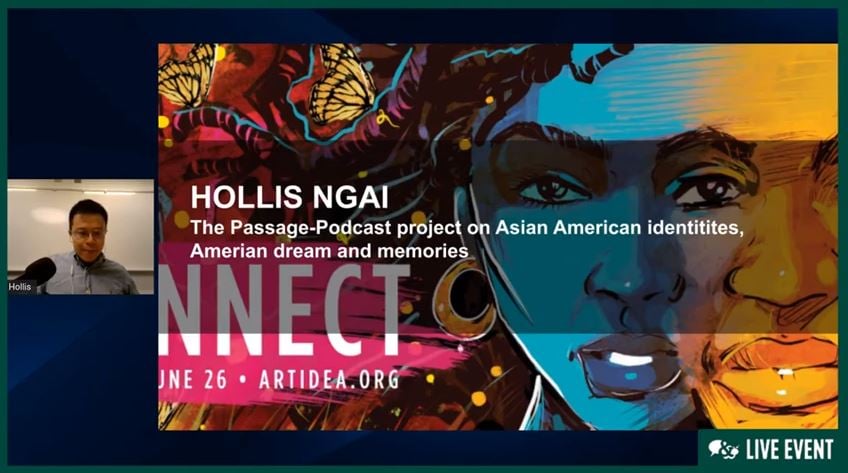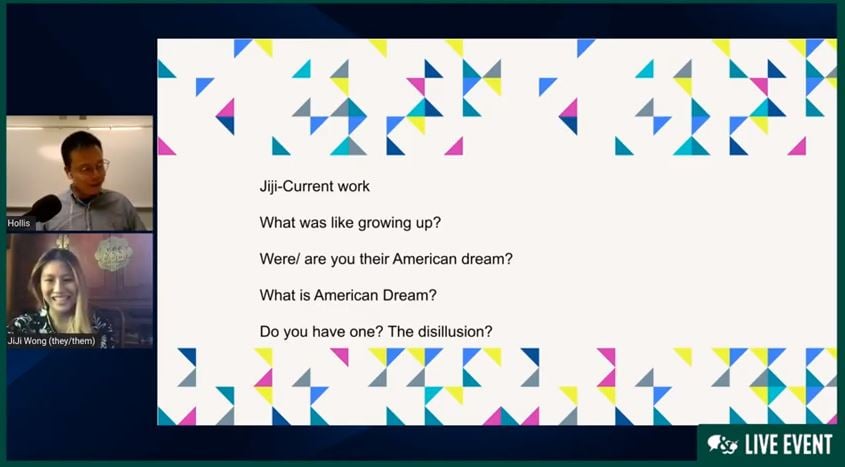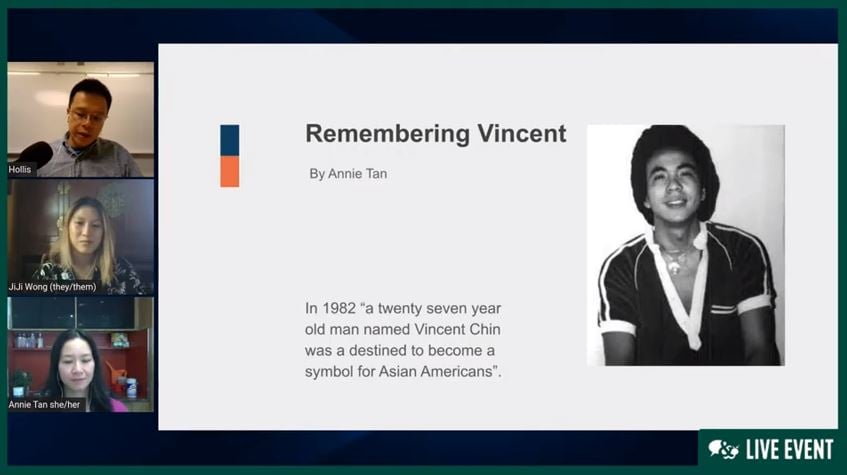
Hollis Ngai introducing his podcast project. Screenshot from the event.
What does it mean to be Asian American? What differences exist in our stories? What common experiences unite us despite our cultural vastness?
How do we uniquely experience American society and racism?
On Tuesday afternoon, artist and podcaster Hollis Ngai asked those questions in a panel from the International Festival of Arts & Ideas titled “The Passage: A Research Podcast Project on Identity, Dreams, Age & Race.” Ngai, who is a 2022 Hong Kong Economic & Trade Office, New York (HKETONY) Arts Activator Fellow with Yale-China welcomed fellow panelists Annie Tan and JiJi Wong.
The discussion ties into his project, which interweaves interviews, stories, and memories into a podcast that presents new perspectives on cultural identities, the American dream, guest's hopes for the future, and race and racism.
The invisibility and racism that Asian Americans face has become, in the past two years, an ongoing topic of discourse. There is currently momentum to Stop Asian Hate following a spike in anti-Asian hate crimes. There’s a movement to require the teaching of Asian American and Pacific Islander (AAPI) history in public schools, including a recent legislative success in Connecticut. There’s the more visible observance of AAPI Heritage Month.
Ngai has been working on this project since he came to New Haven five months ago for his fellowship. Though he grew up in Hong Kong, he received his schooling in the United Kingdom from ages 10 to 18, where he was the only Cantonese kid at his school. It took him two years to become fluent in English, and he adopted an identity of being a foreigner in a new place while also trying to be accepted.
“Looking back, it was a really tough time ….there was some racial abuse,” he said. “I remember often getting into arguments with people about things that I believed in. And then when they would counter argue with me, they would often throw in slurs, mimic my voice, or try to pull out their eyelids. That experience wasn’t kind. It kind of created this psychological barrier within me. I was kind of like an outsider for a long time.”
When he returned to Hong Kong, he joined the arts scene and quickly became a drama teacher. He sees this podcast project as a similar artistic pursuit. Ngai hopes it can “create a passage for people to have a new understanding, or deeper understanding, on what it means to be Asian American in the 21st century.”
Ngai ceded the floor to JiJi Wong, a lifelong New Haven resident and restorative practices mentor in the New Haven Public Schools (NHPS). In their role, they aim to stop students from entering the school-to-prison pipeline by doing restorative, abolitionist work to create community within and outside of schools to build understanding, cultural competency, and networks. Prison abolition is based in the belief that the carceral system is more dangerous than it is effective or rehabilitative.

JiJi Wong (lower square) responds to the on-screen question prompts.
Wong noted the difference in the dreams and career aspirations of the students they work with at schools with less funding and more students of color versus whiter, better funded schools in the district.
“It’s a completely different dynamic,” they said. “Your dream is only as far as you can see down the line. For a lot of these students, they can’t see further than two or three years ahead of them,” said Wong.
As for Wong’s own American Dream, “my dream is for these kids to actually have a dream one day," they said. "That they can have a dream that lasts longer, that is beyond survival to the point where they can think about how they want to thrive…to create a community where these kids can thrive.”
Next joined panelist Annie Tan, a special education teacher in New York City Public Schools, activist, and storyteller. She explained that she did not recognize until later in life the ableism and xenophobia that people threw at her as a child growing up in Chinatown. She did not know the word “immigrant” until fourth grade, and did not have much of an understanding of what her family’s place was in Manhattan.

Annie Tan (bottom square) provides an account of her personal connections and reflections on the murder of Vincent Chin.
While watching a documentary on television, she learned that her mother’s cousin, a 27-year old Chinese American man named Vincent Chin, was murdered in 1982 during an auto workers’ crisis in Detroit, Mich. At the time, white auto workers blamed and targeted Japanese people (and those perceived to be Japanese) for the loss of American jobs. His murder case started a national pan-Asian movement where Asians across ethnic lines came together under the term “Asian American” and mobilize for visibility and change.
“That also changed my concept of who I could be in this world, and what I have become,” said Tan. “It made me realize that life was precious, that it was okay to be curious and know all of this history, and that it was okay to fight to know our history.”
The three also reflected on some of the issues facing American Americans today: the fetishization and stereotyping of Asian women and femmes, an increase in anti-Asian hate crimes in America following the onset of the COVID-19 pandemic in 2020, and the invisibility felt by Asian Americans, especially those who are not East Asian.
While acknowledging the vastness of ethnicities within Asia, Wong summed up the Asian American experience with the term “liminal spaces.''
“We live in the in-betweens,” they said.
But this group will not settle for staying in the shadows of American society, they and Tan added. “Vincent Chin didn’t die for nothing," Tan said. "My great auntie Lily Chin didn’t go all over the nation seeking out justice, teaching us how to be Asian Americans for nothing. And I was not born for nothing,” said Tan.
“Lily brought together these racial solidarity coalitions that exist today. Many, many Asian American organizations would not exist today without what my great Auntie Lily did…We have to know that it’s building community that kills the hate, and that is the only way to move forward together.”
Listen to Ngai’s completed podcast project here. View the full schedule of Arts & Ideas' "Ideas" talks here.